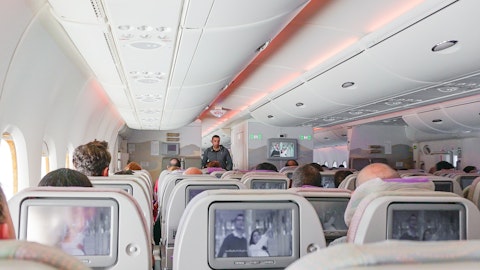Andrew Harrison: Yes. I think the only color I’d probably add there, Mike, is — and I also — when we look at it, we look at weighted average capacity in our markets, and we just see a trend that’s getting less and less. We’ve seen some carriers who play more on the East Coast, move into the West Coast and reduce their capacity. Again, as the industry looks to make sure that their revenues and their costs all work to make sure margins are strong and healthy. So we see the construct for the industry right now is one that’s positive.
Mike Linenberg: Very good. Thanks.
Andrew Harrison: Thanks Mike.
Ben Minicucci: Thanks Mike.
Operator: And our next question comes from Stephen Trent with Citigroup.
Stephen Trent: Good afternoon everybody, and thanks for taking the time. Most of my questions have been answered. Just one really quick one. This might be for you, Shane. When do you think about that that very good credit rating you guys have for Moody’s. To what extent does one or two moves up or one or two moves down, make a meaningful difference as you guys go in negotiate with your co-branded card and fuel hedge counterparties and other similar entities? Thank you.
Nat Pieper: Stephen, great question. It’s Nat. One of the many hats I wear as Treasurer and getting a ratings agency question is just made up from heaven. So thank you. Really excited that Moody’s gave us the investment grade rating. We’ve got a really good story as Ben hit through his commentary, cost execution, terrific operation, balance sheet has been core for so long, and we look at that investment grade rating just as affirmation from an external source that our story is very strong. It certainly helps us when we go into the capital markets, we go negotiate whether it’s for leases, fuel contracts, et cetera, as you say. And it also gives us confidence as with the Hawaiian acquisition and really moving forward, seeing recognition from external parties that the Alaska story is strategically sound.
Stephen Trent: Really appreciate. Thanks for the color.
Ben Minicucci: Thank you.
Operator: And we’ll move next to Dan McKenzie with Seaport Global.
Dan McKenzie: Hey, good morning. Thanks for squeezing me in here. So I guess my first question is for Andrew. Going back to the script and the more to come [ph] comment, of course, that’s going to be my question here. So optimizing upsells, NDC, better merchandising, I guess, first, has Alaska cut over to NDC at this point. And then related to that, how many bookings and how much revenue is on third-party GDSs today? And I guess what I’m really trying to get at is just the percent of tickets Alaska is upselling today? And I guess what I’m really trying to get at is just the percent of tickets Alaska is upselling today on third-party GDSs and what that upsell take rate might look like on alaskaair.com.
Andrew Harrison: Thanks, Dan. Just in short, we are — this ’24 is a big year for us. There’s something like 12 APIs that we’re building out to fully unlock NDC. We have a number of modules already up and running on folks like hopper. So, it’s actually small percentages right now, but we’re seeing the benefits of it, and it’s going to be really good for us, 25% is going to be the year of NDC for us.
Ben Minicucci: We’re building the piping this year. That’s what you’re saying?
Dan McKenzie: Okay. Understood. And I guess another question on IT. Has Alaska begun the transition to the cloud? And if that’s something you’re looking at. Could you help us size that level of cost savings from that shift and also elaborate a little bit on timing?
Shane Tackett: Thanks, Dan. We have been transitioning to modern platforms for a while starting six, seven years ago through the Virgin transition. We are starting to move more of our core IT and more of our sort of commercial e-commerce technology stack into the cloud. We’re big fans of our partners up here in the Pacific Northwest, Microsoft, but we also use other focus as well as [indiscernible]. I think the big thing is it’s a cost increase. It’s a CapEx increase initially and then you need to scale over many, many, many years. And I think it’s going to bode well ultimately for cost efficiency in the years to come. The other thing is we are going to benefit from artificial intelligence, AI. We’ve stood up a full team to go focus on that.
We’re lucky to be in sort of one of the tech capitals of the world who are working on this stuff with a really great partner of Microsoft up the street. So not anymore today, because the time is over or I would have gone on for five minutes with you. But we’re going to get an Investor Day together this year, and we want to talk about technology and AI and the benefits to the company when we get in front of all of you guys later this year. I appreciate everybody’s question we’ll have then wrap it up.
Ben Minicucci: Thanks for joining us on our call. Thank you so much. We will keep you updated on our progress with the 9 MAX and thank you so much, and talk to you next time.
Operator: This concludes today’s conference call. Thank you for attending.
Follow Alaska Air Group Inc. (NYSE:ALK)
Follow Alaska Air Group Inc. (NYSE:ALK)
Receive real-time insider trading and news alerts




